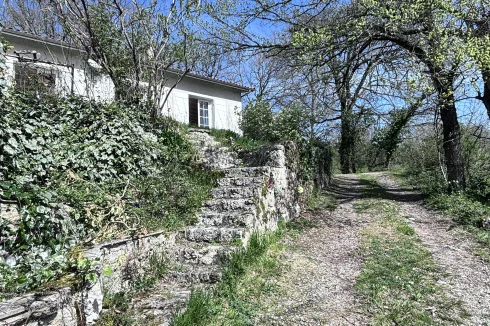Beating the Brexit Deadline
Tuesday 06 October 2020
With less than two months to go until the end of the Brexit transition period, it's not too late to become legally resident in France.
As we have reported previously on these pages, there has been unprecedented demand this year from British nationals to buy property in France in advance of Brexit.
Although from 1st Jan 2021 British nationals will still be able to buy French property, and in exactly the same manner as at present, if they wish to become resident, or stay longer than three continuous months in France, they will need to make application for an entry visa and, ultimately, a residence card.
For many potential buyers that may well merely be an irksome bureaucratic process, but for others the date is more significant.
In particular, those on a modest income will face a tougher test of resources in order to obtain a visa and to later become legally resident, and it will also be necessary to provide evidence of health cover to gain entry. Seniors and those with a serious medical problem may well find that they are unable to obtain the health insurance cover that is needed.
It will also be more difficult for those proposing to make a visa application to set up a business in France. Unless they can demonstrate other 'sufficient' resources, to obtain entry to France on this basis it will be necessary to demonstrate that the business will be economically viable. That is going to be problematic for some applicants.
So for these and other reasons it is not surprising that many British nationals wish to establish residency prior to 31st Dec, as they will then become resident in France under existing regulations; that is to say, as if the UK were still in the European Union.
With less than 2 months to go in order to establish that residency, time is tight to buy a property in France. The legal process itself normally takes around 2 months, although it can be reduced. In particular, often, the reason why the timescale is so long is because SAFER the rural land agency have 2 months to consider whether they wish to pre-empt on the property. With their cooperation, and payment of a fee, this can be reduced to a couple of weeks.
It is clear from the mails we have received on this topic that many buyers consider that only by owning property in France can they obtain legal residency.
That it not so; ownership of property in France has nothing to do with legal residency, as around 3 million French property second-home owners can testify.
To become resident all that is needed is that you have a permanent address in France where you live, which can be achieved by taking a tenancy of a property.
To be legally resident you will also need to meet a minimum income test, but the threshold is very low. You can also apply to join the French health system once you have been in France for at least 3 months (or apply to UK government for S1 if State retired, or set up a small business and obtain it automatically). See our article Moving to France after Brexit for more on these points.
There is no minimum qualifying period required to live in France before 31st Dec; provided you relocate to France before the end of the transition period with the intent of becoming permanently resident that is enough.
The French authority will not be looking for reasons to refuse you residency, but the closer to the end of the year you do relocate, the more precautions you need to take to ensure you are clearly resident.
That may preclude taking lodgings, installing yourself in France in a camper van or mobile home, or other form of temporary accommodation, as they may not be accepted by the French authorities as adequate proof.
So far so good, but the process is still not without risk or difficulty.
I. Tax Implications
Although you do not need to have sold your existing home in the UK to obtain residency, there is a potential tax risk to not having done so.
This is because you will lose your entitlement to principal residence exemption on capital gains in the UK and you will become liable for capital gains tax in France on the eventual sale proceeds of what will then be your second home.
There is relief in France based on duration of ownership, so if you have occupied your UK home for many years you will obtain a discount and you may even be exempt. The detailed rules are set out in our Guide to French Capital Gains Tax.
In addition, if the sale of your home takes place within a year or so of you relocating to France, you may still be able to obtain exemption in France, as we covered in Principal Residence and French Capital Gains Tax.
ii. Formalities
If you are considering a tenancy then in order to be able to demonstrate that you have your permanent home in France we would recommend that:
- The tenancy period should be for a minimum of 6 months. In practice, most French rental contracts are open-ended on the duration of the letting period and in law, where the property is their principal residence, a tenant has the right to a tenancy for at least 1 year (furnished) or 3 years (unfurnished);
- The tenancy agreement should be in writing and in the French language;
- Ensure utility services are in your own name, which may preclude all-inclusive gite type accommodation where services remain in the landlords name; that said, the French government have indicated that, in the case of accommodation with a third party, a dated and signed certificate from the host will suffice, provided they also supply copy of the host's identity card or passport or residence permit, and/or proof of the host's address.
- Perhaps of greatest importance, when you arrive in France, notify in writing by recorded delivery (lettre recommandée accusé de réception) your local mayor and tax office that you have become resident in France. Include your passport with the letter as date and place of birth confirmation provides clearer confirmation;
- Notify HMRC using Form 85 that you have relocated to France; HMRC will, in turn, advise the French tax authority, but there are often delays in that process;
- Finally, you should also retain your travel (ferry, flight) tickets as proof of your date of entry into France.
iii. Finding a Tenancy
At this late stage, we do not underestimate the difficulties of relocating to France and finding a property.
Although the rental sector in France is large, most international landlords in France offer only furnished accommodation, and a French landlord may be unwilling to take on a tenant from abroad on a long-term tenancy. Landlords in France are cautious, not least because tenants have strong security of tenure.
Thank you for showing an interest in our News section.
Our News section is no longer being published although our catalogue of articles remains in place.
If you found our News useful, please have a look at France Insider, our subscription based News service with in-depth analysis, or our authoritative Guides to France.
If you require advice and assistance with the purchase of French property and moving to France, then take a look at the France Insider Property Clinic.





